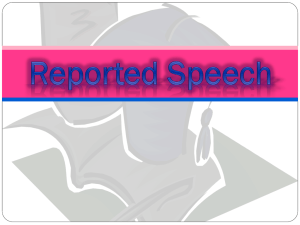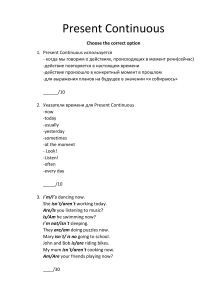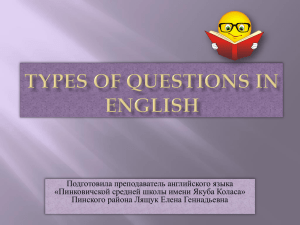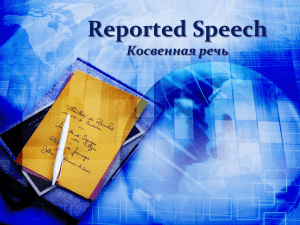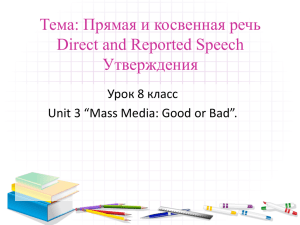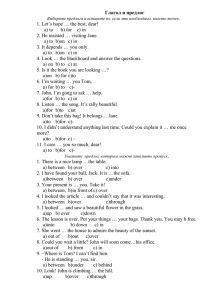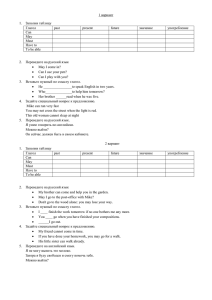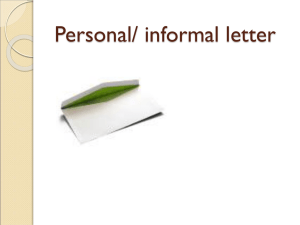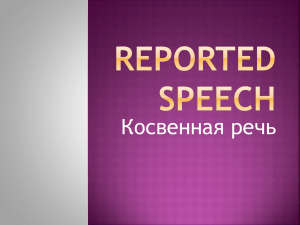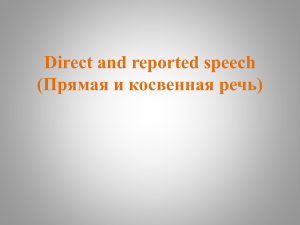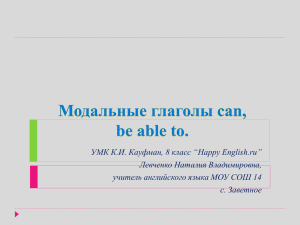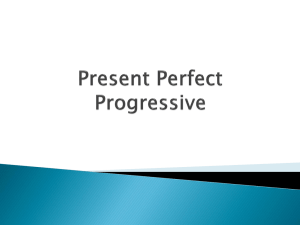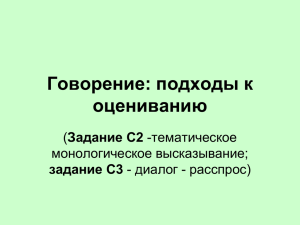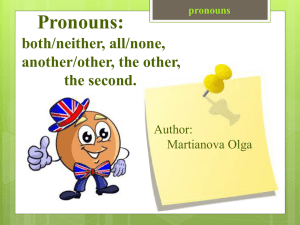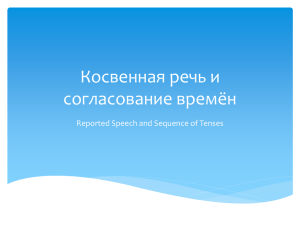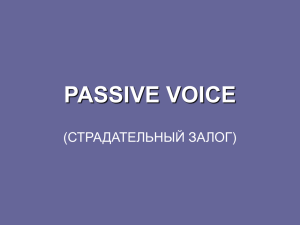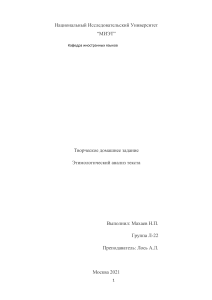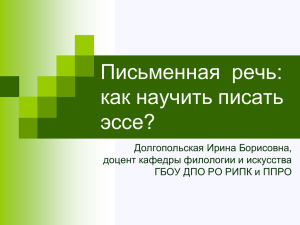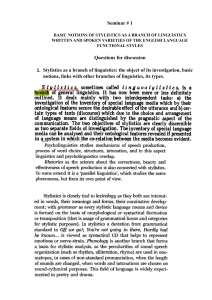The Reported Speech - My E
advertisement
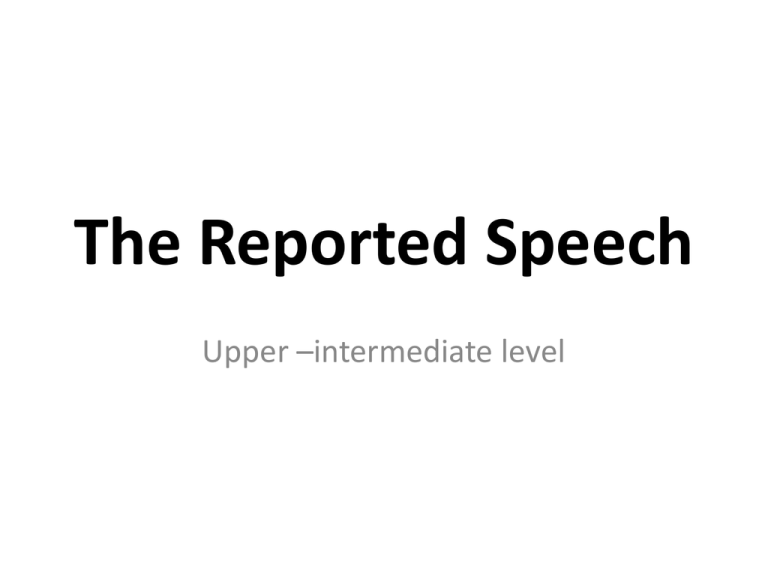
The Reported Speech Upper –intermediate level Direct Speech “It is a nice day,” he said. He says to me, "I know it." Reported Speech He said it was a nice day. He tells me that he knows it. ! Если глагол, вводящий косвенную речь (главное предложение), употреблен в настоящем или будущем времени – Present Simple, Present Perfect, Future Simple, то глагол в косвенной речи (придаточное предложение) остается в том же времени, в каком он был в прямой речи ! Если глагол, вводящий косвенную речь (главное предложение), употреблен в одном из прошедших времен, то время глагола прямой речи заменяется в косвенной речи (придаточном предложении) другим временем, согласно правилу согласования времен. Tenses in Reported Speech Present Simple Present Continuous Past Simple Present Perfect Past Continuous Present Perfect Continuous Future Simple Future Continuous Past Simple Past Continuous Past Perfect, Past Simple Past Perfect Past Perfect Continuous Past Perfect Continuous Would + inf. Would be + verb-ing Do not Change: • Past Perfect • Past Perfect Continuous • Time clause (“I left when it was getting dark,” he said. He said (that) he left when it was getting dark. Modal Verbs: Will Can Can May Shall Shall Must Must Needn’t Needn’t Would Could (present) Would be able to (future) Might/could Should (advice) Would (ask for information) Had to Must (deduction) Didn’t need to/didn’t have to (present) Wouldn’t have to (future) Do not Change: • • • • • • • • Would Could Used to Mustn’t Should Might Ought to Had better Tenses do not change when: • Вводный глагол в настоящем или будущем времени • Законы природы, постоянные состояния • Conditionals Types 2 and 3 • “Up-to-date” reporting Time words: This Tonight Today Now Now that Yesterday Last night Tomorrow Ago That That night That day Then, at the time, at once Since The day before The previous night The following day, the day after Before Say/tell/speak/talk • Say that/say./say to me • Tell me • Speak about • Talk about Expressions with say: • Good morning/evening • Something • One’s prayers • A few words • So • No more • For certain • For sure etc Expressions with tell: • The truth • A lie • (sb) the time • (sb) one’s name • A secret • The way • One from another • sb’s fortune • sb so • The differnce etc Expressions with ask: • A favour • The time • A question • The price etc Special Introductory Verbs: • • • • • • • • • Advise Accuse Admit Apologise Boast Claim Complain Demand Deny • • • • • • • • • Encourage Inform Insist Promise Refuse Remind Threaten Suggest Warn Special Introductory Verbs: “I didn’t do it!” he said. He denied doing/having done it. “I am the cleverest the man !” he said. He boasted that he was the cleverest man. “Sorry, I didn’t call you!” she said. She apologised for not calling. Reported Statements: “I appreciate your help,” he said to me. He said (that ) he appreciated my help. “He is working in the garden now,” I said. I said (that) he was working in the garden then. “I left ten minutes ago,” she said. She said that she had left ten minutes before. Reported Questions: ! В отличие от вопроса в прямой речи, где в большинстве случаев существует обратный порядок слов (кроме вопросов к подлежащему) - перед подлежащим стоит сказуемое или его часть, вопросы в косвенной речи имеют структуру повествовательного предложения, т.е. прямой порядок слов (подлежащее, за ним сказуемое). ! Знак вопроса в конце такого предложения отсутствует. ! Вспомогательный глагол do/does/did не употребляется. Reported Questions: “What are you doing?” he said. He asked what we were doing. “When did you come home yesterday?” he said. He asked me when I had come home the day before. Reported Questions: • Ask • Wonder • Inquire • Want to know Reported Questions: ! Общие вопросы заменяются придаточным предложением, которое присоединяется к главному при помощи союзов if и whether, имеющих значение частицы ли. Запятая не ставится. Reported Questions: “Do you know the answer?” he said. He asked if/whether we knew the answer. “Have you done the washing-up?” she said. She said if/whether we had done the washingup. Indirect Questions: • Could you tell me…? • Do you know…? • Please tell me… • I wonder if … • Tell me… • Have you any idea…? • I want to know… etc Indirect Questions: ! Порядок слов – прямой! What is he doing? Do you know what he is doing? Where have they been? I wonder where they have been? Have you seen my dog? Could you tell me if you have seen my dog? Reported commands/suggestions: He said, "Stop the car.“ He told me to stop the car. He said to me, "Don't go there.“ He told me not to go there. “Let’s go shopping!” he said. He suggested going shopping. The End
